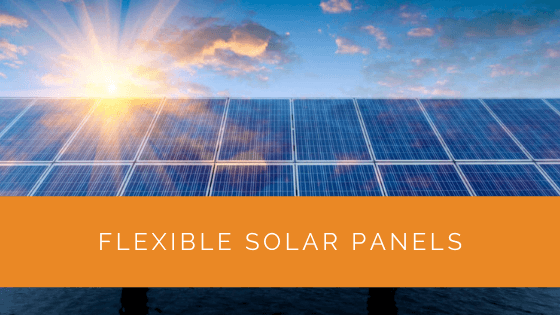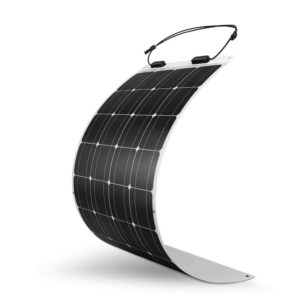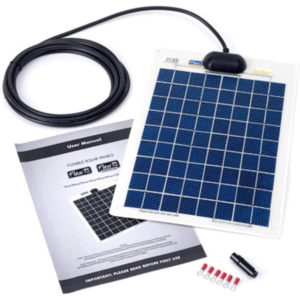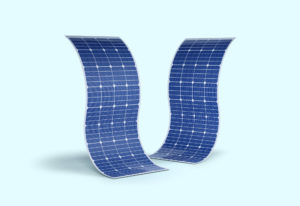Solar panels are a great option for people who wish to choose a renewable energy source. There are different types of solar panels, among which flexible solar panels are gaining a lot of attention. This is because flexible solar panels are portable and provide renewable energy when you are on the go.
Campers, boaters, and people who travel often find flexible solar panels very useful. Solar power will help keep all your devices powered at all times. You will get clean solar power, and you do not have to worry about your devices dying.
The guide offers you complete information about flexible solar panels. It also focuses on the pros and cons of these flexible panels so you can make an informed choice.
Contents
- 1 Key Takeaways
- 2 What Are Flexible Solar Panels?
- 3 How Do Flexible Solar Panels Work?
- 4 Types of Flexible Solar Panels
- 5 How Do You Choose The Flexible Solar Panels?
- 6 Top Flexible Solar Panels
- 7 Benefits of Flexible Solar Panels
- 8 Drawbacks of Flexible Solar Panels
- 9 How Do You Maintain A Flexible Solar Panel?
- 10 Case Study: Implementing Flexible Solar Panels for a Mobile Lifestyle
- 11 Expert Insights From Our Solar Panel Installers About Flexible Solar Panels
- 12 Summing Up
Key Takeaways
- Flexible solar panels are portable and provide renewable energy on the go, making them useful for campers, boaters, and travellers.
- These panels are made from ultra-thin silicon cells, converting sunlight into electricity through the photovoltaic effect.
- When choosing flexible solar panels, consider size, efficiency, durability, and wattage, and be aware of their lower efficiency than rigid panels. Proper maintenance is crucial for maximizing their lifespan and efficiency.
What Are Flexible Solar Panels?
When you are travelling, portable batteries will help you charge your devices. However, they will eventually run out of power, and your devices will die. That is why you need a source of clean solar energy which can continually charge your devices.
Flexible solar panels are portable solar panels made from ultra-thin silicon cells. The solar panels get their flexibility due to this thinner composition.
The flexible panels get power from sunlight, which will help charge your devices. You will not have to worry about your devices dying down due to lack of power. However, flexible solar panels have low-efficiency ratings of around 7% to 15%; hence, you will need more if you have many devices.
How Do Flexible Solar Panels Work?
Flexible solar panels work similarly to rigid solar panels. They absorb sunlight and convert the photon energy into electricity. It is known as the photovoltaic effect. When the photon comes in contact with the solar module, electrons flow in the solar cell due to this energy. It leads to the production of electric current.
The electricity you receive is direct current or DC power. It is ideally present in battery-powered equipment. When you use this power for commercial and household usage, it converts from DC to AC power or alternating current.
The only difference between flexible and rigid solar panels is their texture. It means you must keep the rigid solar panels fixed, whereas you can carry the flexible solar panels around.
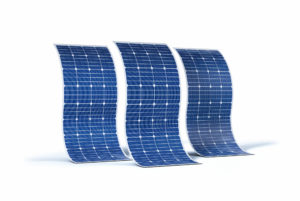
Types of Flexible Solar Panels
You will come acrossmany types of solar panels on the market. Below are three solar panels or solar cells that you will find.
Monocrystalline Solar Panel
A monocrystalline solar panel is made from pure solid crystals. These monocrystalline cells have good electron flow, are highly efficient, and are smaller. However, this monocrystalline silicon solar cell might be expensive for most people.
Polycrystalline Solar Panel
A polycrystalline solar panel is made from multiple silicon shards. They have lower efficiency as compared to monocrystalline silicon solar cells. However, the polycrystalline solar panel is a more affordable option for people.
Thin Film Solar Panels
Thin-film panels can be either mono or poly, but as the name suggests, they are very thin. These solar panels are extremely flexible and thinner than conventional solar panels. The thin-film solar cells also offer better performance in low light. However, they are not as efficient as rigid panels.
How Do You Choose The Flexible Solar Panels?
It would be best to look into certain factors for flexible solar panels.
Size and Design
The first thing you need to focus on is the size and design of the flexible solar panel. If the space is large, such as an RV roof, you can have multiple options for the right flexible solar panel. However, if the space is small, you must choose a high-efficient flexible solar panel.
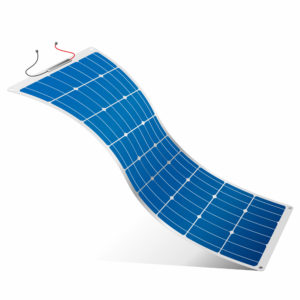
Efficiency
Generally, the efficiency of a flexible solar panel is lesser than that of a traditional solar panel. However, It can be very beneficial during low-light circumstances. If the efficiency level of the flexible solar panel is low, then you require more panels.
Durability
It would be best to look for a durable, flexible solar panel that you can use for a long time. The solar panel should be able to endure the conditions of the road. Generally, these solar panels are very durable and built for travel.
Wattage
If the solar panel wattage is high, then the electricity production will be high. Calculating the solar panel’s daily output would be best to determine how many solar panels you require.
Top Flexible Solar Panels
With an increase in renewable energy sources, there has been an increase in solar manufacturers. Below are two examples of solar panels that are quite well-known. You can find more options in the market.
Renogy Flexible Monocrystalline Solar Panel
- Available in 50 Watt and 100 Watt
- Very lightweight
- High-efficiency monocrystalline solar panels
RS PRO PV Logic Flexi Solar Panel
- Available in 20-watt
- Waterproof
- Amazing design
Benefits of Flexible Solar Panels
The benefits of a flexible solar panel are as follows –
- Flexible solar panels are very flexible.
- Since these solar panels are made for travel, they are very compact.
- The solar panels are extremely durable and can withstand different road conditions.
- Flexible solar panels are adaptable for multiple solar applications.
Drawbacks of Flexible Solar Panels
The drawbacks of flexible solar panels are –
- Flexible solar panels are less efficient than rigid solar panels.
- Solar panels have a shorter lifespan.

How Do You Maintain A Flexible Solar Panel?
Flexible solar panels have lower efficiency and shorter lifespan. However, by maintaining them properly, you can maximize their efficiency. The tips for maintaining them efficiently are as follows –
- It would be best not to step on the solar cells when mounting the solar panel on a vehicle roof or other structures. Even though the solar panel is durable, silicon solar cells can get damaged. It would reduce the longevity and productivity of solar cells.
- The solar panels may be flexible, but it is better not to bend them. There are limits to their flexibility, and bending them will lead to cracks.
- Properly storing the flexible solar panel is essential to ensure its longevity and efficiency. When storing them, ensure they are flat and do not keep any other item on them.
- It would be best if you cleaned the flexible solar panel from time to time to maximize the power performance of the panels. Clean them only with plain water and a soft cloth so you do not scratch the surface. If you use a solar panel in a snowy region, clean them frequently to avoid accumulating snow.
- It is necessary to store flexible solar panels when you are no longer using them. If the panels are exposed to external elements and UV light, they could degrade over time.
- When you mount them on the vehicle roof, you must use Velcro to secure the solar panel to the roof. It will help keep the solar panels in place when you are driving. Hence, the solar panels will not fall from the roof even if you drive on a rough trail.
Case Study: Implementing Flexible Solar Panels for a Mobile Lifestyle
Background
At Solar Panels Network, we specialise in providing customised solar solutions to meet diverse energy needs. This case study explores the application of flexible solar panels for a family living a mobile lifestyle, travelling in an RV across the UK.
Project Overview
The family required a reliable power source for their RV to support essential devices and appliances during their travels. Their priorities included portability, ease of installation, and sufficient energy output to sustain daily needs. They chose flexible solar panels for their lightweight and adaptable nature.
Implementation
- System Design and Selection: After assessing the RV’s available roof space and energy requirements, we recommended a combination of monocrystalline and thin-film flexible solar panels. Monocrystalline panels were selected for their higher efficiency, while thin-film panels offered excellent performance in low-light conditions, ensuring consistent energy supply regardless of weather.
- Installation Process: The installation involved securing the panels to the RV roof using Velcro strips and adhesive, allowing for easy removal and repositioning. The system included a charge controller to regulate the energy flow and protect the batteries from overcharging. Additionally, a compact inverter was installed to convert DC to AC power for standard appliances.
- Monitoring and Maintenance: We equipped the system with a monitoring device to track energy production and usage, helping the family optimise their power consumption. We provided a maintenance guide emphasising regular cleaning and careful handling to avoid damage to the flexible panels.
Results
- Energy Independence and Reliability: The flexible solar panel system provided enough power to cover essential needs, such as lighting, refrigeration, and charging electronic devices. The combination of monocrystalline and thin-film panels ensured reliable energy production, even on cloudy days.
- Cost Savings and Efficiency: By using solar energy, the family reduced their reliance on external power sources, saving on fuel costs for generators and campsite electricity fees. The initial investment in flexible solar panels was recouped within the first year, thanks to these savings.
- Portability and Convenience: The lightweight nature of the flexible panels made them easy to install and remove, allowing the family to set up their solar array quickly at each new location. This flexibility was particularly beneficial for a mobile lifestyle, where adaptability and ease of use are paramount.
Summary
This case study demonstrates the practicality and benefits of flexible solar panels for mobile applications. The family’s experience highlights the importance of choosing the right panel types and maintaining them properly to maximise efficiency and longevity. At Solar Panels Network, we continue to support our clients in finding the best renewable energy solutions to suit their unique needs, whether stationary or on the move.
Expert Insights From Our Solar Panel Installers About Flexible Solar Panels
Flexible solar panels are an excellent choice for those on the move, such as campers and boaters. Their lightweight and portable design makes them easy to set up and pack away, providing reliable power in remote locations.
Solar Energy Specialist
While flexible solar panels are versatile and convenient, it’s important to be aware of their lower efficiency compared to rigid panels. This means you might need more panels to achieve the same power output, especially in low-light conditions.
Senior Solar Installer
Maintenance is key to prolonging the lifespan and efficiency of flexible solar panels. Regular cleaning and proper storage, especially avoiding excessive bending, can help maintain their performance over time.
Chief Installation Technician
Summing Up
One of the drawbacks of being on the move is you cannot charge your devices. With flexible solar panels, you can keep your devices charged the whole time. However, you need to ensure you make the right choice when opting for these solar panels.
Look for the manufacturer and the efficiency of the solar panel. You also need to ensure that the solar panels are durable. Maintaining the solar panels is also crucial to ensure the sun’s power reaches them without hindrance.
Choose the right flexible solar panels and enjoy your journey without worrying about your devices.
About the Author
Solar Panels Network stands at the forefront of solar energy solutions, driven by a team of seasoned solar engineers and energy consultants. With over decades of experience in delivering high-quality solar installations and maintenance, we are committed to promoting sustainable energy through customer-centric, tailored solutions. Our articles reflect this commitment, crafted collaboratively by experts to provide accurate, up-to-date insights into solar technology, ensuring our readers are well-informed and empowered in their solar energy decisions.

